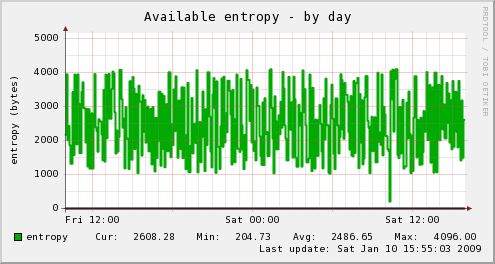cd
git clone https://github.com/blackfuel/haveged-arm-asuswrt.git
cd haveged-arm-asuswrt
./haveged.sh
Usage: haveged [options]
Collect entropy and feed into random pool or write to file.
Options:
--buffer , -b [] Buffer size [KW], default: 128
--data , -d [] Data cache size [KB], with fallback to: 16
--inst , -i [] Instruction cache size [KB], with fallback to: 16
--file , -f [] Sample output file, default: 'sample', '-' for stdout
--Foreground, -F Run daemon in foreground
--run , -r [] 0=daemon, 1=config info, >1=<r>KB sample
--number , -n [] Output size in [k|m|g|t] bytes, 0 = unlimited to stdout
--pidfile , -p [] daemon pidfile, default: /var/run/haveged.pid
--verbose , -v [] Verbose mask 0=none,1=summary,2=retries,4=timing,8=loop,16=code,32=test
--write , -w [] Set write_wakeup_threshold [bits]
--help , -h This help
Website for haveged
Manpage for haveged
The haveged project is an attempt to provide an easy-to-use, unpredictable random number generator based upon an adaptation of the HAVEGE algorithm. Haveged was created to remedy low-entropy conditions in the Linux random device that can occur under some workloads, especially on headless servers. Current development of haveged is directed towards improving overall reliability and adaptability while minimizing the barriers to using haveged for other tasks.
Downloads and release notes for haveged are found here.
Background on the details of the linux random device, a survey of other solutions to entropy shortages, and notes on the design and evolution of haveged are extracted from the home page that graced this site for several years.
The original HAVEGE research dates back to 2003 and much of the original haveged documentation is now quite dated. Recent work on haveged has included an effort to provide more recent information on the project and its applications.
The original research behind HAVEGE use was based upon studies of the behavior of processor caches from a hardware level. The 'Flutter' documents below attempt to provide a modern view of HAVEGE at software level through the use of a diagnostic build of haveged that captures the non deterministic inputs to haveged for analysis by external tools.
- FAQ
- Runtime Testing
- Processor Flutter - Part 1
- Processor Flutter - Part 2
- Processor Flutter - Part 3
The current version of haveged is 1.9.1 .
gary at issiweb dot com
Like haveged? You may also be interested in topvhost.
Recent support for haveged provided by Ben Eleventh Consulting.
